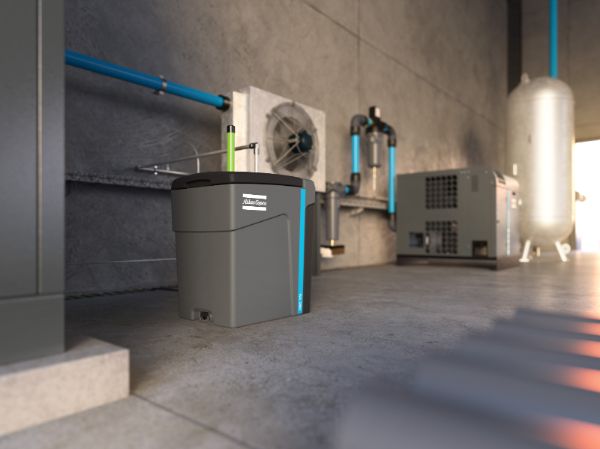Did you know that almost every air compressor produces liquid water during operation? In fact, depending on the size of your system and the humidity in the air, an industrial compressor can generate gallons of water in just one day. This liquid, called condensate, may look harmless at first, but without proper condensate management, it can damage equipment, increase maintenance costs, and even harm the environment.
That’s why understanding air compressor condensate management is not just about keeping your system dry; it’s about protecting your investment and ensuring smooth operations. Let’s break it down in simple terms.
What Is Condensate?
When an air compressor takes in atmospheric air, it also pulls in moisture. As the air gets compressed, its temperature rises. When that hot, pressurized air cools down, the moisture turns into liquid water. This liquid is called condensate.
But condensate is not just water. It often contains oil, dirt, and tiny particles from the compression process. Left unmanaged, it can clog filters, damage tools, and create safety issues. That’s where a condensate management system comes into play.
Why Condensate Management Matters
Think of condensate like an unwanted byproduct of air compression. If it isn’t removed properly:
- Equipment damage – Moisture corrodes pipes, tools, and machinery.
- Reduced efficiency – Water buildup lowers air quality and affects performance.
- Environmental risks – Untreated condensate may contain oil and needs safe disposal.
- Higher costs – More maintenance, frequent repairs, and downtime.
In short, condensate management is about efficiency, safety, and sustainability.
How Does a Condensate Management System Work
A condensate management system is designed to collect, separate, and safely remove condensate from your compressed air system. Here’s how it typically works:
- Collection – Condensate forms in filters, dryers, tanks, and pipes. It is collected in drain points.
- Separation – Devices like oil-water separators ensure that oil and contaminants are separated from water.
- Disposal – Clean water is discharged safely, while oil and waste are handled according to environmental rules.
This system keeps your compressor running smoothly while meeting Canadian safety and environmental standards.
Condensate in Canadian Industries
Different industries across Canada face unique challenges when it comes to condensate:
- Manufacturing – Excess moisture can damage pneumatic tools and affect production quality.
- Food and Beverage – Air quality is critical. Even a trace of water or oil in compressed air can contaminate products.
- Automotive – Paint jobs and assembly lines require clean, dry air. Condensate issues can cause costly rework.
- Pharmaceuticals – High standards demand pure compressed air. Condensate must be carefully managed.
- Mining and Heavy Industry – Large compressors generate huge amounts of condensate daily, requiring robust systems.
Without proper air compressor condensate management, these industries risk downtime and product quality issues.
Common Methods of Condensate Removal
Managing condensate doesn’t have to be complicated. Here are some common methods:
- Manual Drains – Simple but require regular attention. Not practical for large systems.
- Automatic Drains – Remove condensate at set intervals without manual checks.
- Oil Water Separators – Essential in industries where condensate contains oil.
- Complete Condensate Management Systems – Integrated solutions for large-scale operations, ensuring compliance and efficiency.
The choice depends on the size of your compressor, the amount of condensate produced, and your industry’s needs.
Interesting Fact: Condensate Adds Up
Here’s something that surprises many businesses: a 100-horsepower compressor running in a humid environment can generate over 20 liters of condensate per day. That’s nearly 140 liters a week, enough to fill multiple buckets. Without a proper system, that much water can create chaos in your operations.
Partnering with Experts in Toronto and Canada
Managing condensate isn’t something businesses should overlook. The good news is, you don’t have to handle it alone.
Air CompPower in Toronto is a trusted name in air compressor condensate management. With over 15 years of experience, they provide tailored solutions across Canada. As an authorized distributor of Atlas Copco industrial air compressors, air dryers, vacuum pumps, and blowers, they not only supply world-class products but also offer installation, service, and maintenance.
Their focus is on minimizing downtime, maximizing energy efficiency, and ensuring compliance with environmental regulations. Whether you need a condensate management system, a new compressor, or expert air compressor service in Toronto, their team has the expertise to keep your business running smoothly.
Conclusion
Condensate may seem like a minor byproduct, but it plays a big role in the performance and safety of your air compressor system. Without proper management, it can damage equipment, reduce efficiency, and create costly problems.
If your business is looking for reliable air compressor condensate management in Toronto or across Canada, Air CompPower is here to help. With their experience, partnership with Atlas Copco, and commitment to sustainability, you can count on them for solutions that last.
Visit Air CompPower today to explore their services and discover how the right condensate management system can protect your operations.
FAQs
What is compressor condensate?
It’s the liquid water mixed with oil and dirt that forms when compressed air cools down.
How to prevent condensation in an air compressor?
Use dryers, filters, and a condensate management system to keep air dry and clean.
What causes a compressor to condensate?
Moisture in the intake air turns into liquid when compressed and cooled.
How to drain condensate from an air compressor?
Install automatic drains or use a condensate management system for safe removal.
Why is condensate management important?
It prevents equipment damage, improves efficiency, and ensures safe disposal of wastewater.

